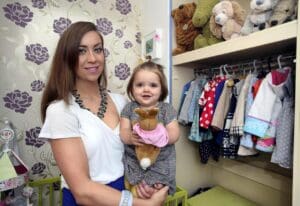The upside? You’re going places. And while expertly balancing the demands of motherhood and a career is not always plain-sailing (yes, you’ve arrived into the office with vomit on your jacket and yes, a nappy squashed inside your laptop once fell onto the floor mid-meeting) overall you’re doing pretty good.
Until, that is – you decide to bring your child to work. Then you may as well clear your desk, ask your boss for your P45 and bid a firm adieu to your former career. Because your offspring and your place of employment should never mix: it’s selfish, it’s ill-advised, and it’s downright unacceptable.
 I have a child myself – a squirming, energetic two-year-old girl who’s about as easy to manage as a bag full of hungry weasels. Would I ever dream of bringing her to work? Absolutely not.
I have a child myself – a squirming, energetic two-year-old girl who’s about as easy to manage as a bag full of hungry weasels. Would I ever dream of bringing her to work? Absolutely not.
Firstly, I’d be far too embarrassed to inconvenience my colleagues like that. But more importantly, I’d know that’s a decision that would irreversibly damage my professional reputation. My co-workers would – understandably – view me as incapable, unorganised and entirely lacking in focus. Much like arriving in for your shift still drunk after a heavy-night’s partying, having your little one by your side as you attempt (and in all likelihood fail) to get a day’s work done is quite rightly seen as a big no-no.
Answering your phone – sorry, I have a nappy to change. Attending an important meeting – no-can-do, my baby is sticking his hand in a socket. Deadline – what deadline! My princess needs feeding.
Of course, ideally no working woman would be deemed incapacitated for having children. After all, men rarely are. And maybe we’re gradually moving in that direction: over in the US babies-at-work programmes are becoming more established. Marissa Mayer, Yahoo’s 39-year-old CEO and mother-of-one, famously returned to work just two weeks after giving birth, duly bringing her infant son along with her. But here’s the difference – she’s a multi-millionaire Silicon Valley executive who even had a nursery constructed adjacent to her office to better juggle her responsibilities. Sadly Marissa, and wonderful as she is, just isn’t reflective of the real world most ordinary working women find themselves in.
So let’s put aside what’s fair and what isn’t. Let’s instead just be honest – most of all with ourselves. Yes, children get sick; childcare falls through, and plans get scrapped. But the answer isn’t to simply bring your baby to work. Ever. Because having it all also means being a professional. It means separating our work-life from our domestic commitments. Above all, it means recognising that the demands of your child and the demands of your job should never merge.

